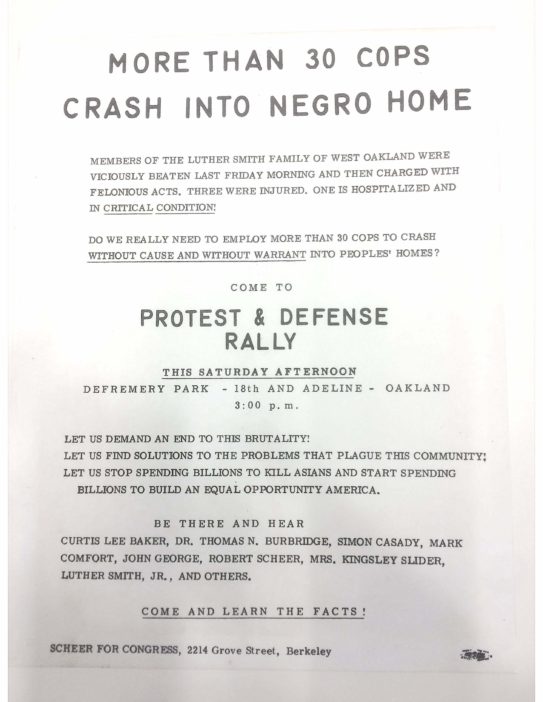The Luther Smith case provoked immediate public outcry, as evidenced by this flyer created in the week after the incident. DeFremery Park in West Oakland, where protestors were scheduled to meet and hear speeches, was a favorite site for public meetings and protests; in 1968, Robert F. Kennedy and the Black Panther Party would both hold well-attended rallies there.
This flyer, published by the Robert Scheer congressional campaign, shows the array and diversity of scheduled speakers at the rally. Scheer was then running a left-wing primary challenge against incumbent Democratic congressman Jeffrey Cohelan, whose district encompassed much of northern Alameda County, including the flatlands of Oakland and Berkeley. Cohelan had a solid liberal voting record, but his unwillingness to challenge President Johnson on funding for the Vietnam War angered many constituents, particularly student activists in Berkeley. These activists would form the early core of the campaign’s volunteer support.
Scheer’s strategy relied on heavy voter turnout not just among students in Berkeley, but also from the flatland neighborhoods of Oakland and Berkeley, especially densely-populated West Oakland, and he worked diligently in 1965-66 to build connections among neighborhood leaders there. His platform made the case to these voters that the war in Vietnam and the war on poverty were inextricably linked, with increased funding for the former sapping funds and effectiveness from the latter. The campaign sought to understand and address the concerns of flatlands residents, supporting the popular demand for a civilian review board to investigate police misconduct.
Other speakers at the rally included Flatlands contributors Curtis Lee Baker, Mark Comfort and John George, alongside political heavyweights like former San Francisco NAACP president Dr. Thomas Burbridge and former California Democratic Council (CDC) chair Simon Casady. The attention of such an array of politically-influential figures ensured that the Smith case remained in the news for weeks, with successive demonstrations and speeches before the city council by activists keeping interest in the case alive.
